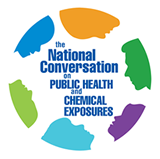Agency for Toxic Substances and Disease Registry
U.S. federal public health agency
The Agency for Toxic Substances and Disease Registry (ATSDR) is a federal public health agency of the United States Department of Health and Human Services. It was established in 1985 under the Comprehensive Environmental Response, Compensation, and Liability Act (CERCLA), also known as the Superfund Act. The ATSDR is headquartered in Atlanta, Georgia, and works in conjunction with the Centers for Disease Control and Prevention (CDC).
Mission[edit | edit source]
The mission of the ATSDR is to protect communities from harmful health effects related to exposure to natural and man-made hazardous substances. The agency assesses the presence and nature of health hazards at specific Superfund sites, helps prevent or reduce further exposure, and increases knowledge about the health effects of exposure to hazardous substances.
Functions[edit | edit source]
The ATSDR performs several key functions:
- Conducting public health assessments of waste sites
- Providing health consultations concerning specific hazardous substances
- Conducting health surveillance and registries
- Responding to emergency releases of hazardous substances
- Conducting applied research in support of public health assessments
- Providing education and training concerning hazardous substances
Public Health Assessments[edit | edit source]
Public health assessments are a critical function of the ATSDR. These assessments evaluate data and information on the release of hazardous substances into the environment to assess any current or future impact on public health. The ATSDR works closely with other federal, state, and local agencies to conduct these assessments.
Health Consultations[edit | edit source]
Health consultations are responses to specific requests for information about health risks related to a specific site, chemical release, or hazardous material. These consultations provide advice on actions to protect public health.
Emergency Response[edit | edit source]
The ATSDR is involved in emergency response activities related to the release of hazardous substances. The agency provides technical support and health information to federal, state, and local agencies during emergencies.
Research and Education[edit | edit source]
The ATSDR conducts research to fill gaps in knowledge about the health effects of hazardous substances. The agency also provides education and training to health professionals and the public about the risks associated with hazardous substances.
Related Pages[edit | edit source]
- Centers for Disease Control and Prevention
- United States Department of Health and Human Services
- Comprehensive Environmental Response, Compensation, and Liability Act
- Superfund
- Public health
Search WikiMD
Ad.Tired of being Overweight? Try W8MD's NYC physician weight loss.
Semaglutide (Ozempic / Wegovy and Tirzepatide (Mounjaro / Zepbound) available. Call 718 946 5500.
Advertise on WikiMD
|
WikiMD's Wellness Encyclopedia |
| Let Food Be Thy Medicine Medicine Thy Food - Hippocrates |
Translate this page: - East Asian
中文,
日本,
한국어,
South Asian
हिन्दी,
தமிழ்,
తెలుగు,
Urdu,
ಕನ್ನಡ,
Southeast Asian
Indonesian,
Vietnamese,
Thai,
မြန်မာဘာသာ,
বাংলা
European
español,
Deutsch,
français,
Greek,
português do Brasil,
polski,
română,
русский,
Nederlands,
norsk,
svenska,
suomi,
Italian
Middle Eastern & African
عربى,
Turkish,
Persian,
Hebrew,
Afrikaans,
isiZulu,
Kiswahili,
Other
Bulgarian,
Hungarian,
Czech,
Swedish,
മലയാളം,
मराठी,
ਪੰਜਾਬੀ,
ગુજરાતી,
Portuguese,
Ukrainian
Medical Disclaimer: WikiMD is not a substitute for professional medical advice. The information on WikiMD is provided as an information resource only, may be incorrect, outdated or misleading, and is not to be used or relied on for any diagnostic or treatment purposes. Please consult your health care provider before making any healthcare decisions or for guidance about a specific medical condition. WikiMD expressly disclaims responsibility, and shall have no liability, for any damages, loss, injury, or liability whatsoever suffered as a result of your reliance on the information contained in this site. By visiting this site you agree to the foregoing terms and conditions, which may from time to time be changed or supplemented by WikiMD. If you do not agree to the foregoing terms and conditions, you should not enter or use this site. See full disclaimer.
Credits:Most images are courtesy of Wikimedia commons, and templates, categories Wikipedia, licensed under CC BY SA or similar.
Contributors: Kondreddy Naveen



